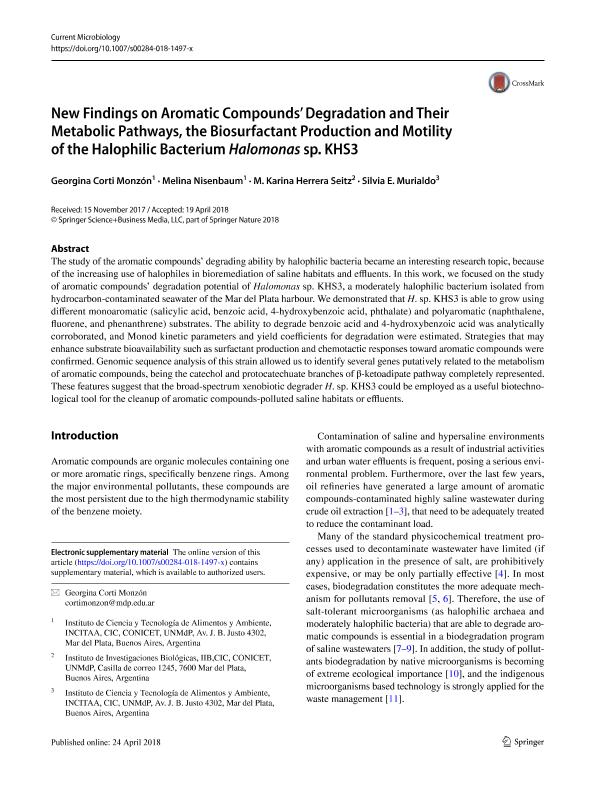Artículo
New Findings on Aromatic Compounds’ Degradation and Their Metabolic Pathways, the Biosurfactant Production and Motility of the Halophilic Bacterium Halomonas sp. KHS3
Corti Monzón, Georgina de la Paz ; Nisenbaum, Melina
; Nisenbaum, Melina ; Herrera Seitz, Karina
; Herrera Seitz, Karina ; Murialdo, Silvia Elena
; Murialdo, Silvia Elena
 ; Nisenbaum, Melina
; Nisenbaum, Melina ; Herrera Seitz, Karina
; Herrera Seitz, Karina ; Murialdo, Silvia Elena
; Murialdo, Silvia Elena
Fecha de publicación:
08/2018
Editorial:
Springer
Revista:
Current Microbiology
ISSN:
0343-8651
e-ISSN:
1432-0991
Idioma:
Inglés
Tipo de recurso:
Artículo publicado
Clasificación temática:
Resumen
The study of the aromatic compounds’ degrading ability by halophilic bacteria became an interesting research topic, because of the increasing use of halophiles in bioremediation of saline habitats and effluents. In this work, we focused on the study of aromatic compounds’ degradation potential of Halomonas sp. KHS3, a moderately halophilic bacterium isolated from hydrocarbon-contaminated seawater of the Mar del Plata harbour. We demonstrated that H. sp. KHS3 is able to grow using different monoaromatic (salicylic acid, benzoic acid, 4-hydroxybenzoic acid, phthalate) and polyaromatic (naphthalene, fluorene, and phenanthrene) substrates. The ability to degrade benzoic acid and 4-hydroxybenzoic acid was analytically corroborated, and Monod kinetic parameters and yield coefficients for degradation were estimated. Strategies that may enhance substrate bioavailability such as surfactant production and chemotactic responses toward aromatic compounds were confirmed. Genomic sequence analysis of this strain allowed us to identify several genes putatively related to the metabolism of aromatic compounds, being the catechol and protocatechuate branches of β-ketoadipate pathway completely represented. These features suggest that the broad-spectrum xenobiotic degrader H. sp. KHS3 could be employed as a useful biotechnological tool for the cleanup of aromatic compounds-polluted saline habitats or effluents.
Palabras clave:
Halomonas
,
Microorganisms
,
Hydrocarbons
,
Biodegradation
Archivos asociados
Licencia
Identificadores
Colecciones
Articulos(CCT - MAR DEL PLATA)
Articulos de CTRO.CIENTIFICO TECNOL.CONICET - MAR DEL PLATA
Articulos de CTRO.CIENTIFICO TECNOL.CONICET - MAR DEL PLATA
Articulos(IIB)
Articulos de INSTITUTO DE INVESTIGACIONES BIOLOGICAS
Articulos de INSTITUTO DE INVESTIGACIONES BIOLOGICAS
Citación
Corti Monzón, Georgina de la Paz; Nisenbaum, Melina; Herrera Seitz, Karina; Murialdo, Silvia Elena; New Findings on Aromatic Compounds’ Degradation and Their Metabolic Pathways, the Biosurfactant Production and Motility of the Halophilic Bacterium Halomonas sp. KHS3; Springer; Current Microbiology; 75; 8; 8-2018; 1108-1118
Compartir
Altmétricas



